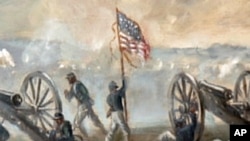Many people would be surprised to know that there were some Asian faces in the
crowds of white and black soldiers serving in the American Civil War.
The participation of Asians, and in particular Chinese Americans, comes into focus this month as the United States marks the 150th anniversary of the start of the war.
It began in 1861 after the election of an anti-slavery president, Abraham Lincoln. Fearing the eventual abolition of slavery, eleven southern states bolted from the union, setting up the pro-slavery Confederate States of America.
Listen to the full interview with Ruthanne Lum McCunn
The rebels resisted military efforts by the North to bring them back into the union, sparking four years of war that left more than 600,000 people dead.
Even though there were only about 200 Chinese-Americans living in the eastern United States at the time, 58 of them fought in the Civil War. Because of their previous experiences at sea, many of them served in the U.S. Navy.
Only one Chinese-American soldier was actually born on American soil. The rest had come to the U.S. through the Pacific slave trade, adoption by Americans, independent immigration or the influence of missionaries.
Author Ruthanne Lum McCunn, an expert on Chinese-American history, says three Chinese-Americans rose to the rank of corporal in all-white units. “This might not seem like much but if you look at the way the armed services were operating at that time, it actually was significant,” she said.
Corporal Joseph Pierce, who as a child was brought to the United States from China by his adoptive father, fought in several major campaigns of the war including Antietam and Gettysburg. He was honored by having his picture displayed at the Gettysburg Museum.
“It is also important to remember that not all the Chinese who fought in the Civil War fought for the Union,” McCunn said. “At least five have been identified as fighting for the Confederacy,” she pointed out.
Two of these, Christopher and Stephen Bunker, were children of Siamese twins Chang and Eng, who had been brought to the U.S. to appear in the Barnum and Bailey Circus. The twins, of Chinese heritage, became prosperous, slave-owning farmers in North Carolina. It was not surprising, therefore, that their sons should fight for the South.
With so few Asians in the country, many Americans were puzzled as to how Chinese should be classified racially. "At the time of the 1860 census, there was only the differentiation of white, black and mulatto [mixed race],” McCunn explained.
Many people in 1800’s America had never even seen a person of Asian background. “There was a young Chinese, John Tomney, who served in a New York outfit, and when he was captured, a rebel general asked him, ‘What are you—a Mulatto, Indian or what?’” McCunn said.
Indications are that the Chinese soldiers were treated fairly well in the ranks. “I think whereas these men seemed to have been accepted by their fellow soldiers, what’s important to remember is the institutional racism of the time,” McCunn said.
Racism, of course, was at the heart of the system of black slavery and it is not surprising that Asians would also suffer discrimination.
Even though an 1862 act of Congress promised U.S. citizenship to any honorably discharged foreign veteran, Chinese Americans were denied that right because an earlier law allowed the naturalization of whites only.
“There were Chinese, like Edward Day Cohota, who not only served in the Civil War, but became a soldier in the regular army after the war, and served for 20 years—he was denied citizenship,” McCunn said.
In 1882, Congress passed the Chinese Exclusion Act, which until 1943 made it technically illegal for Chinese to become citizens, although the law was inconsistently enforced.
Years after the war, Cohota was said to have enjoyed telling his children that he had voted repeatedly--in fact, had cast his ballots for Republicans for 30 years--before it was found out that he was not really a citizen and therefore not qualified to vote.
In 2008, Congressman Mike Honda, himself of Asian descent, persuaded Congress to pass a resolution honoring the contribution of Asian-Americans in the U.S. Civil War.
Even so, Ruthanne McCumm points out, Chinese-Americans are yet to be included in any histories of the war and their participation is unknown to many.











